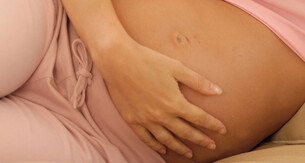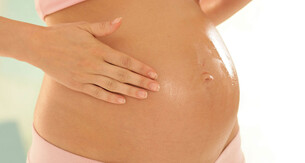By now, your baby is more than 5 cm in size, so about as big as an extra large egg, and weighs about 16 grams. Sizes can vary, however, as each child develops at their own pace. Your baby will be constantly moving about in your womb, which means it’s hard to measure their size completely accurately. Another reason why babies at this stage won’t all be the same size is the genetic information from their father and mother. These differences in size and weight will become even more pronounced during the second trimester, which will begin in two weeks.
Pregnancy weeks:
Week 12 of pregnancy: It’s time to tell people

Size of your baby in week 12
Your baby’s development
What it’s like for the mum-to-be in week 12
Top tips
Questions you may want to ask your doctor or midwife
It might be an appropriate time to tell your employer that you’re pregnant. This might help you from getting some moral support for your pregnancy journey. Quite apart from that, your baby is now developing in leaps and bounds.
Size of your baby in week 12

Your baby’s development
In week 12, as in the weeks to come, your baby will grow longer and longer. As they get bigger and bigger, their vital internal organs will begin to work: for example, their stomach can now ingest substances. Your baby will now begin to swallow small amounts of amniotic fluid, allowing them to practise breathing and train for swallowing and ingesting food. At this stage, they will often spit the amniotic fluid out because they haven’t quite got the hang of it yet (they still need practice after they’re born – newborns who drink too quickly from their mother’s breast frequently choke).
Your baby will be very active in week 12, using the space they have to do all sorts of gymnastics.
They can also react to stimuli for the first time, as their conduction system, nervous system and brain are now sufficiently developed. For instance, if they sense something in front of their little mouth while thrashing around, their sucking reflex will kick in. This reflex is crucial after they’re born, as sucking is the only way they can get food during their first few months outside the womb.
A trained eye would be able to spot the slight movements of your baby’s eyelids in an ultrasound scan, and shutting their eyes completely is something else they’ll need to practise (later on, this will also develop as a reflex). If pressure is applied to your belly from the outside, they’ll suddenly move away from the abdominal wall. This is another reflex, though it will change, as over the next few weeks they’ll begin to react to signs of affection from the outside by turning towards it instead.
It’s still impossible to determine your baby’s sex, so you’ll have to wait a little while longer – week 16 is the earliest that a doctor may be able to tell if it’s a girl or a boy. By now, however, it will be clear whether or not you’re expecting twins.
What it’s like for the mum-to-be in week 12
You’ll be excitedly waiting for the first faint signs of movement from your baby. Unfortunately, you’ll have to wait a bit longer for that too, though the chances of detecting your baby’s movements increase as your baby gets bigger.
Common signs and symptoms
Your bump begins to emerge
You’ll now begin to notice a bit of a bump as a result of the weight you’ve gained from your body’s increased fat reserves. Other people might notice your bump in the next few weeks and, if it’s your second or third pregnancy, it will be visible sooner. If you tell your family and friends that you’re pregnant, however, they’ll focus on how your bump looks every time you meet up with them.
As you’re now gaining weight at a rate of 250 to 300 grams a week, the question of clothes, and especially of finding comfy things to wear, will become more and more of an issue. Keep a close eye on your weight.
You’re in control of, and responsible for, how much weight you actually gain. Eating healthily is a key part of this: don’t eat for two, make sure you get a healthy, balanced diet, and remember to get enough exercise.
Nutrient deficiency
Many pregnant women feel tired at times – it’s a normal part of pregnancy. If you feel tired a lot more often, however, and if your iron levels are low, then it’s a sign that you’re not getting enough iron in your diet. This is often the case if you’re a vegetarian or vegan.
Generally speaking, there’s nothing wrong with a vegetarian diet during pregnancy. If you’re not eating meat or fish, however, you have to think harder about how you can get the iron and protein you need from other foods. A vegetarian diet that includes milk and other dairy products is absolutely fine, but pregnant vegetarians should choose their food especially carefully to ensure they don’t suffer from any nutrient deficiencies.
It can be a real challenge for vegetarians to get enough iron during pregnancy, as your body finds it easier to process the iron in meat (known as haem iron) than the iron in plants – peas, spinach, dark fruits and wholemeal products all contain iron, but only small amounts of it can be absorbed by the body. Vitamin C can help increase your iron intake, and in turn help supply your baby with more iron.
In short, you should eat more food that contains iron in combination with fruits high in vitamin C.
For women who are vegans, and who therefore don’t eat meat, fish, dairy products or eggs, getting enough nutrients during pregnancy is a lot harder. If you previously ate a vegan diet, you should get advice from an experienced dietician, who can recommend supplements that can help you get the micronutrients you need to avoid deficiencies.
We recommend that both vegans and vegetarians go to their doctor regularly for blood tests.
Top tips
- If you’re a vegetarian or vegan, buy a suitable pregnancy cookbook and seek specialist advice.
- Make sure you keep scheduling appointments with your doctor or midwife.
- Ask your friends and family if they have any maternity wear you can use.
Questions you may want to ask your doctor or midwife
Important blood tests
If you often feel tired or feel extremely tired at times, you should go to your doctor or midwife to have your iron levels checked via blood tests. They will tell you if you have any nutrient deficiencies, such as low iron levels, and they can recommend particular food or supplements to get your levels back up to where they should be.
Information about the author:
Juliane Jacke-Gerlitz is a registered nurse. She has been working in the field of mother and breastfeeding counselling for more than ten years. Currently she is working as a medical writer and psychological consultant. Juliane Jacke-Gerlitz has been married for 22 years, is a mother of eight children and lives with her family in Halle.
Chat with us on Messenger at m.me/hipp.ph




